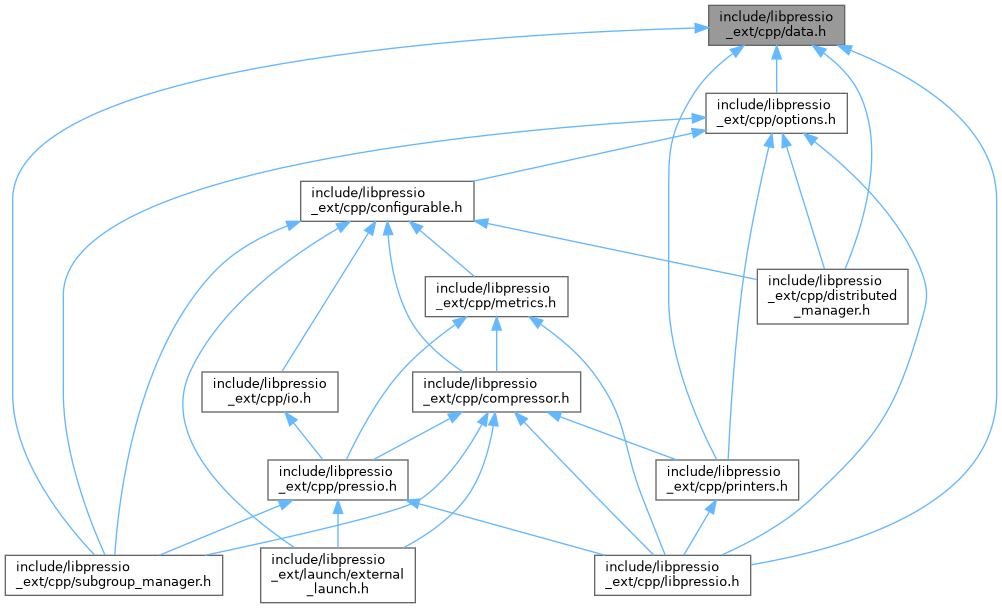C++ pressio_data interface. More...
#include <stdexcept>#include <vector>#include <cstdlib>#include <cstring>#include <utility>#include <algorithm>#include "pressio_data.h"#include "libpressio_ext/cpp/dtype.h"#include "std_compat/utility.h"#include "std_compat/optional.h"
Include dependency graph for data.h:

This graph shows which files directly or indirectly include this file:

Go to the source code of this file.
Classes | |
| struct | pressio_data |
Functions | |
| template<class T > | |
| pressio_data_delete_fn | pressio_new_free_fn () |
| size_t | data_size_in_elements (size_t dimensions, size_t const dims[]) |
| size_t | data_size_in_bytes (pressio_dtype type, size_t const dimensions, size_t const dims[]) |
| template<class ReturnType , class Function > | |
| ReturnType | pressio_data_for_each (pressio_data const &data, Function &&f) |
| template<class ReturnType , class Function > | |
| ReturnType | pressio_data_for_each (pressio_data &data, Function &&f) |
| template<class ReturnType , class Function > | |
| ReturnType | pressio_data_for_each (pressio_data const &data, pressio_data const &data2, Function &&f) |
| template<class ReturnType , class Function > | |
| ReturnType | pressio_data_for_each (pressio_data &data, pressio_data &data2, Function &&f) |
Detailed Description
C++ pressio_data interface.
Function Documentation
◆ data_size_in_bytes()
| size_t data_size_in_bytes | ( | pressio_dtype | type, |
| size_t const | dimensions, | ||
| size_t const | dims[] | ||
| ) |
- Parameters
-
[in] type the dtype of the data object [in] dimensions the number of dimensions of the data object [in] dims the actual of dimensions of the data object
- Returns
- the size of a data object in bytes
◆ data_size_in_elements()
| size_t data_size_in_elements | ( | size_t | dimensions, |
| size_t const | dims[] | ||
| ) |
- Parameters
-
[in] dimensions the number of dimensions of the data object [in] dims the actual of dimensions of the data object
- Returns
- the size of a data object in elements
◆ pressio_data_for_each() [1/4]
template<class ReturnType , class Function >
| ReturnType pressio_data_for_each | ( | pressio_data & | data, |
| Function && | f | ||
| ) |
get beginning and end pointers for two input data values
- Parameters
-
[in] data first input data set [in] f templated function to call, it must return the same type regardless of the type of the inputs. it should have the signature template <class T> f(T* input_begin, T* input_end)
◆ pressio_data_for_each() [2/4]
template<class ReturnType , class Function >
| ReturnType pressio_data_for_each | ( | pressio_data & | data, |
| pressio_data & | data2, | ||
| Function && | f | ||
| ) |
get beginning and end pointers for two input data values
- Parameters
-
[in] data first input data set [in] data2 second input data set [in] f templated function to call, it must return the same type regardless of the type of the inputs. it should have the signature template <class T, class U> ReturnType f(T* input_begin, T* input_end, T* input2_begin) where U is some type
◆ pressio_data_for_each() [3/4]
template<class ReturnType , class Function >
| ReturnType pressio_data_for_each | ( | pressio_data const & | data, |
| Function && | f | ||
| ) |
get beginning and end pointers for two input data values
- Parameters
-
[in] data first input data set [in] f templated function to call, it must return the same type regardless of the type of the inputs. it should have the signature template <class T> f(T* input_begin, T* input_end)
◆ pressio_data_for_each() [4/4]
template<class ReturnType , class Function >
| ReturnType pressio_data_for_each | ( | pressio_data const & | data, |
| pressio_data const & | data2, | ||
| Function && | f | ||
| ) |
get beginning and end pointers for two input data values
- Parameters
-
[in] data first input data set [in] data2 second input data set [in] f templated function to call, it must return the same type regardless of the type of the inputs. it should have the signature template <class T, class U> ReturnType f(T* input_begin, T* input_end, T* input2_begin) where U is some type
◆ pressio_new_free_fn()
template<class T >
| pressio_data_delete_fn pressio_new_free_fn | ( | ) |
pressio_data_delete_fn for handling deleting data allocated with new T[];